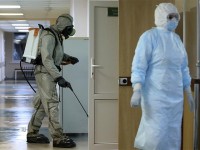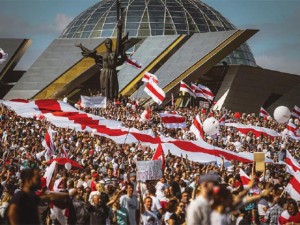He said Belarus would likely face economic tightening not only as a result of the coronavirus pandemic but also a Russian trade oil crisis that worsened this past winter.
Uladzimir Matskevich: The situation in Armenia is as tense as it can be

The revolt — social explosion — in Armenia is quite possible; however, it is not Sasna Tsrer actions that will work as a detonator.
The actions of Sasna Tsrer group are a symptom of a very serious tension in the country and suppressed public and political activity.
On July 31, after 15 days inside a seized police station in Yerevan, Sasna Tsrer group has decided to surrender to the authorities. But to surrender as prisoners of war.
A member of the group, Varuzhan Avetisyan, explained this decision as follows: “We consider people’s uprising finished; we have a popular movement now. In order to avoid new victims — since people in front of us are doing their duty — we decided that we don’t want the blood of these people and will continue to struggle in the status of prisoners of war.”
Philosopher Uladzimir Matskevich, who has recently returned from the scene, told the EuroBelarus Information Service about the situation in Armenia.
— On July 31, after 15 days inside a seized police station in Yerevan, Sasna Tsrer group surrendered. Why has the opposition made such a radical step as the capture of the police station, running the risk of becoming “terrorists” forever?
— To answer the question, it is necessary to understand the situation in Armenia.
For a long time the situation in Armenia was similar to Belarus, Ukraine and other former Soviet countries. For a while it looked more democratic in comparison with other post-Soviet countries — the situation was only more complicated because of the Karabakh conflict and permanent confrontation with Azerbaijan.
President Serzh Sargsyan came to power through democratic elections. But in the end the faction of Serzh Sargsyan, actually started to dismiss the democratic process. On the one hand, the media are monopolized by Sargsyan’s regime; on the other hand — Russian propaganda is extremely rampant in Armenia. With all of this, economic, social and political difficulties are keeping the Armenian people in constant tension. Without the access to the democratic options, people’s stress focuses on the radical protest moods.
Armenians are very peaceful people, who fight heroically in wars, but rarely use violence in peaceful life.
The actions of Sasna Tsrer group are a symptom of a very serious tension in the country and suppressed public and political activity. People went to the extreme, perhaps even without much hope to turn it into a broad popular movement. However, now the overwhelming majority of the Armenian people are on the side of the Sasna Tsrer. But this support is passive; people have tried to support the group with food and were attending rallies. I was at one of such rallies in Yerevan — it was a very peaceful and disciplined action. When about 5 thousand people marched to the seized police station, the police was used to disperse them in order to prevent these people from joining Sasna Tsrer group.
The next day, the protesters were attacked by “titushky” — half-criminals, who are closely tied to the current regime. Sargsyan’s regime has intertwined with criminals, who are now used for political purposes — to put pressure on the protesters and disperse them. The authorities were the first to resort to violence.
The attitude to the actions of the Sasna Tsrer is twofold: on the one hand, people support the slogans, share the goals and ideals of the group and its leader, who is currently in prison; they support the initiative to release all political prisoners. However, Armenians don’t support the means that Sasna Tsrer group has resorted to.
— In July 2015 Yerevan was covered in protests against the rise of electricity tariffs. Now political demands substituted economic requirements. Is Armenian society radicalizing?
— In a certain sense. A year ago, economic demands brought a lot of Yerevan citizens to protests. And though Armenians have somehow solved their economic difficulties, claims to the authorities have remained.
Moreover, Sargsyan’s regime has learned nothing from those protests, and the state machine is getting more and more closely tied with mafia. Now among political demands anti-Russian motives can be heard more often.
There’s no direct occupation of Armenia on the part of Russia, all the more that it’s quite hard to do it when there is no common border, but Armenia disposes a Russian military base. The main sign of the relative occupation of Armenian is the complete dependence of the President and the Government of Armenia on Russia — both economic and political. Even the final accession of Armenia to the Customs Union, which was clearly unnecessary for Armenia, took place under the direct diplomatic and military pressure from Russia. Russia has a very significant leverage on Armenia — Azerbaijan. According to the agreements, after receiving the right to dispose a military base, a small contingent of Russian soldiers in Armenia, Russia should support its territorial integrity and independence. But Russia sells five times more weapons to Azerbaijan than to Armenia, delivering the most sophisticated weapons to Baku at first request.
Any armed conflict in Nagorno-Karabakh is a way to put pressure on Armenia and make the Armenian state more agreeable towards Russia.
— Can we say that the four-day war in Nagorno-Karabakh this April was instigated by Russia?
— There are no direct references to that. At the same time, it is clear that Baku doesn’t want and is not ready for an escalation of the military conflict with Armenia. Such occasional clashes were obviously inspired. The connection between the armed clashes on the Armenian-Azerbaijani border and the Russian political requirements can be traced easily.
— “Popular uprising continues, our people should fight, we won’t allow our country to become a Russian province. We feel that the victory is near, and we call on the Armenian people to decide and make a positive step,” said a member of the group Varuzhan Avetisyan. Is it a political forecast or mere romantic hopes of revolutionaries?
— If we remove the political romanticism from the statements, the truth would be that the situation in Armenia is as tense as it can be. The revolt — social explosion — in Armenia is quite possible; however, it is not Sasna Tsrer actions that will work as a detonator. For now it is not a rebellion, rather a passive discontent, though extremely massive.
Others
-
From farewell to a new Eastern policy and towards a new development
Poland and Germany were both initiators and drivers of a New Eastern policy linked to the Eastern neighborhood and Russia/Soviet Union.
-
Uladzimir Matskevich: The sooner the "Union State" is denounced, the better for Belarus
Not only does the “Union State” undermine the establishment of civilized relations with Europe, but it hinders the possibility of normal relations between Belarus and Russia.
-
Uladzimir Matskevich: The regime can no longer control the situation in the country
The authorities are unable to prolong the social contract with the people: there is no way out of the social crisis.
-
Press release of the BNP in connection with the next round of the dialogue in the format of the EU-Belarus Coordination Group
Belarusan National Platform of the Eastern Partnership Civil Society Forum welcomes the dialogue process in the format of the EU-Belarus Coordination Group, the third round of which was held in Minsk on 3-4 April 2017.








Comments
Andrei Yahorau — Al Jazeera: “Lukashenko is irresponsible”
He said Belarus would likely face economic tightening not only as a result of the coronavirus pandemic but also a Russian trade oil crisis that worsened this past winter.